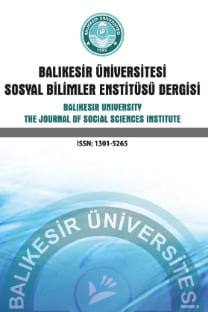İNGİLİZCE'Yİ YABANCI DİL OLARAK ÖĞRENENLERİN KALEM-KAĞIT VE BİLGİSAYAR ÖRNEKLERİNDE YAZMA NİTELİĞİ ÜZERİNDEKİ CİNSİYET ETKİSİ
Problem Durumu: Bir değişken olarak cinsiyetin, yabancı dil öğreniminde önemli bir araştırma ve tartışma alanı olmasının yam s›ra bilgisayar da yabanc› dilde yazma derslerinde kullan›lan yayg›n bir araç ve önemli bir araştırma konusudur. Yapılan çalışmalar, kız öğrencilerin bilgisayar ortamında yazmaya karşı olumsuz tutum sergilediklerini ve İngilizce öğrenenlerin bilgisayarda ürettikleri yazma örneklerinin nitelikleri üzerindeki cinsiyet etkisi konusunda uzlaşı ve yeterli bulgu olmadığını göstermektedir. Araştırmanın Amacı: Bu araştırmada, İngilizce'yi yabancıl dil olarak öğrenenlerin sınıf ve bilgisayar ortam›nda ürettikleri yazma örneklerinin nitelikleri üzerindeki cinsiyet etkisinin bulunmas› amaçlanmıştır. Yöntem: Yirmi kalem-kağıt ve 20 bilgisayar grubu öğrencisine ait yazma örnekleri, analitik puanlama yöntemi ile puanlandırılmış ve elde edilen puanların istatistik analizi yapılmıştır. Bulgular ve Sonuçlar: Çalışma sonucunda, cinsiyetin; yazma örneklerindeki sözcük bilgisi, dil bilgisi, organizasyon, yarat›c›l›k, bütünlük, tutarl›l›k, uygunluk, ak›c›l›k, içerik ve dil kontrolü nitelikleri üzerinde anlamlı bir etkiye sahip olduğu, ancak noktalama ve imla üzerinde etkisinin olmadığı bulunmuştur. Öneriler: İleride yapılacak olan araştırmaların bilgisayar kullanımında kız öğrencilerin taşıdıkları kaygı, ilgi ve tutumlar üzerinde yoğunlaştırılması önerilmektedir.
Anahtar Kelimeler:
Cinsiyet, Bilgisayar, Yazma Nitelikleri, Yabancı Dil olarak İngilizce
Gender Effect on The Writing Quality of Pen-Paper and Computer Samples of EFL Learners
Problem Statement: While gender as a variable is a significant research and discussion area in foreignlanguage learning, computers are not only common tools in EFL writing classes but also a researchsubject in foreign language learning. Previous research indicates that female learners have negativeattitudes on writing on computers and there have not been certain findings and consensus on gender effecton computerized writing samples of EFL learners.Purpose: This research aimed to investigate the gender effect on writing quality of pen-paper andcomputerized samples of EFL learners.Method: Writing samples of 20 pen-paper and 20 computer group students were scored analytically andanalyzed statistically.Findings and Results: It was found that gender had a significant effect on vocabulary, accuracy,organization, originality and creativity, unity and coherence, relevance, fluency, content, and languagecontrol of the samples produced on computer while it had no effect on mechanics of the computerizedsamples.Recommendations: It is recommended that further research should focus on computer anxiety, interest,and attitudes of female EFL learners
Keywords:
Gender, Computer, Writing Quality, English as a Foreign Language,
___
Burley, H. (1994). Postsecondary Novice and Berter Than Novice Writers: The Effects of Word Processing and A Very Special Computer Assisted Language Lab. Paper Presented at the South-Western Educational Research Association Meeting, San Antonio, TX.Campbell, N. J. (1989). Computer Anxiety of Rural Middle and Secondary School Students. Journal of Educational Computing Research, 5,213220.
Clark, A. & Trafford, J. (1996). Return To Gender: Boys' and Girls' Attitudes and Achievements. Language Learning Journal, 14,4049.
Cochran-Smith, M. (1991). Word Processing and writing in Elementary Classroom: A Critical Review of Related Literature. Review of Educational Research, 61,107155.
Conteh-Morgan, M. (2002). Connecting The Dots: Limited English Proficiency, Second Language Learning Theories, and information Literacy instruction. The Journal of Academic Librarianship, 28(4), 191196.
Daiute, C. (1985). Writing and Computers, Menlo Park: Addison-Wesley.
Goldberg, A., Russell, M. & Cook, A. (2003). The Effect Of Computers on Student Writing: A Meta-Analysis of Studies From 1992 To 2002. Journal of Technology, Learning, and Assessment, 2 (I). Retrieved from http://www.bc.edu/research/intasc/jtla/journal/pdf/v2nl_jtla.pdf
Grignon, J.R. (1993). Computer Experience of Menominee Indian Students: Gender Differences in Coursework and Use of Software. Journal of American Indian Education, 32,115.
Harrington, S., Shermis, M. D. & Rollins, A. L. (2000).Computers and Testing: The Influence of Word Processing on English Placement Test Results. Computers and Composition, 17 (2), 197210.
Hawisher, G. E. & Fortune, R. (1989).Word Processing and the Basic Writer. Collegiate Microcomputer, 5,275287.
Hawisher. G. E. (1989). Research and Recommendations for computers and composition. In Hawisher, Gail E., and Selfe, Cynthia L., (Eds.) Critical Perspectives on Computers and Composition Instruction. Teachers College Press, New York, 44-69.
Jannsen Reinen, I. & Plomp, T. (1993). Some Gender Issues in Educational Computer Use: Results of An International Comparative Survey. Computer in Education, 20,353365.
Keogh, T., Barnes, P., Joiner, R. & Littleton, K. (2000). Gender, Pair Composition, and Computer Versus Paper Presentation of An English Language Task. Educational Psychology, 20,3343.
King, V. Birnbaum, J. & Wageman, J. (1984). Word Processing and the Basic College Writer. In T. Martinez (Ed.), the Written Word and the Word Processor. Philadelphia, PA: Delaware Valley Writing Council.
Levin, T. & Gordon, C. (1989). Effect of Gender and Computer Experience on Attitudes Toward Computers. Journal ofEducational Computing Research, 5,6988.
Phinney, M. (1991). Computer-assisted Writing and Apprehension in ESL Students. In P Dunkel (Ed.), Computer-assisted language learning and testing: Research issues and practice, New York: Newbury House, 189204
Rhodes, B. K. & Ives, N. (1991). Computers and Revisions Wishful Thinking or Reality? ERIC: ED331035.
Siann, G., Macleod, H., Glissov, P. & Durndell, A (1990). The Effect of Computer Use on Gender Differences in Attitudes to Computers. Computers- and Education,14(2), 183191.
Taylor, C, Kirsch, I., Eignor, D. & Jamieson, J. (1999). Examining the Relationship between Computer Familiarity and Performance on Computer-Based Language Tasks. Language Learning, 49,219274.
Tercanlioglu, L. (2004). Exploring Gender Effect on Adult Foreign Language Learning Strategies. Issues in Educational Research, 14(2), 181193.
Warschauer, M. & Healey, D. (1998). Computers and Language Learning: An Overview. Language Teaching, No: 31,5771.
Whitely, B. E. (1997). Gender Differences in Computer-Related Attitudes and behavior: A Meta-Analysis. Computers in Human Behavior, 13,122.
Wolfe, E. W. & Manola, J. R. (2005). An Investigation of the Impact of Composition Medium on the Quality of TOEFL Writing Scores. TOEFL Research Reports, RR72.
Zandvliet, D. & Farragher, P. (1997). A Comparison of Computer Administered and Written Tests. Journal of Research on Computing in Education, 29(4), 423438.
- ISSN: 1301-5265
- Yayın Aralığı: Yılda 2 Sayı
- Başlangıç: 1998
- Yayıncı: Balıkesir Üniversitesi Sosyal Bilimler Enstitüsü
Sayıdaki Diğer Makaleler
SANAYİCİLERİN DOĞA KORUMA ALGISI: BANDIRMALI SANAYİCİLER VE KUŞ CENNETİ MİLLj PARKI ÖRNEĞİ
Zekeriya GÖKTAŞ, Ali Naci ARIKAN
ATATÜRK, TÜRKİYE CUMHURİYETİ VE TÜRKÇE DEVRİMİ
ÇANAKKALE MUHAREBELERİNİ KONU EDİNEN ROMANLARÜZERİNE
Olca SÜRGEVİL, Ö Okan FETTAHLIOĞLU, Sinem GÜCENMEZ, Gülay BUDAK
